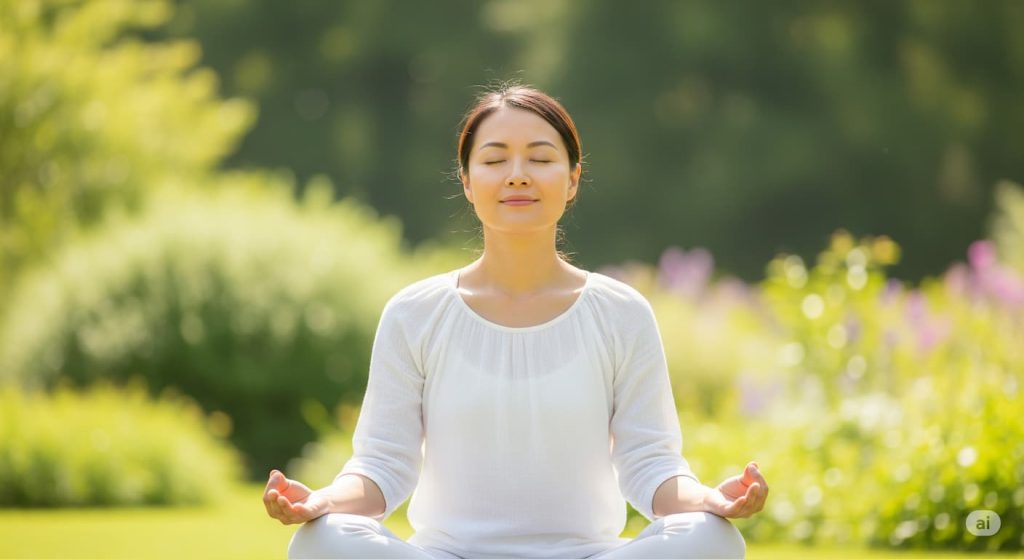- Introduction: The Simple Secret to Inner Peace
- What Is Mindfulness?
- What Is Mindfulness Meditation?
- Mindfulness Meditation Benefits for Beginners
- Key Takeaway:
- Real-Life Example:
- Common Mistakes and How to Avoid Them
- Frequently Asked Questions (FAQs)
- Final Thoughts: Begin Your Journey to Inner Peace
Introduction: The Simple Secret to Inner Peace
Ever feel like your mind is always racing, like there’s too much noise in your head? You’re not alone. Most of us are juggling too many things at once — work, family, stress, phones, notifications, and expectations. In this fast-paced world, finding peace feels almost impossible. But there is a powerful practice that can help, and it’s simpler than you think: mindfulness meditation.
In this article, we’ll explore what mindfulness meditation really is, how it works, and why mindfulness meditation benefits are life-changing. If you’re looking for mindfulness for beginners, this is your step-by-step guide to getting started on a calmer, more present, and peaceful life.
What Is Mindfulness?
Understanding the Concept
Mindfulness means paying full attention to the present moment — without judgment. It’s about being aware of what you’re doing, thinking, or feeling right now. Not yesterday, not tomorrow. Just now.
Imagine sipping a hot cup of tea and actually tasting it, feeling the warmth, and noticing the aroma. That’s mindfulness in action.
Where It Comes From
Mindfulness has roots in Buddhist meditation, but today it’s practiced worldwide as a secular method for improving mental and physical health. You don’t have to be religious or spiritual to practice mindfulness meditation. Anyone can do it — anytime, anywhere.
What Is Mindfulness Meditation?
A Simple Definition
Mindfulness meditation is the practice of focusing your attention on the present moment, often using the breath as an anchor. When your mind wanders (and it will!), you gently bring it back.
How It Works
- You sit or lie down comfortably.
- You close your eyes and focus on your breath.
- When thoughts, emotions, or distractions arise, you notice them and return to your breath.
You’re not trying to clear your mind or stop thinking. You’re simply learning to observe your thoughts without reacting to them.
Real-Life Analogy
Think of your mind like a snow globe. When you shake it, everything is cloudy. But when you set it down, the snow begins to settle. Mindfulness meditation helps settle your thoughts so you can see clearly.

Mindfulness Meditation Benefits for Beginners
Mental and Emotional Benefits
- Reduces stress and anxiety
- Helps manage depression
- Improves focus and concentration
- Enhances emotional regulation
- Promotes self-awareness and clarity
Physical Health Benefits
- Lowers blood pressure
- Improves sleep quality
- Strengthens the immune system
- Reduces chronic pain
Relationship Benefits
- Improves communication
- Increases empathy
- Strengthens emotional connection with others
Key Takeaway:
Mindfulness meditation benefits are not just mental — they touch every part of your life, including your health, work, and relationships.
Mindfulness for Beginners: How to Start Practicing Today
Step-by-Step Guide
- Find a Quiet Space: Sit in a calm, quiet area where you won’t be disturbed.
- Set a Timer: Start with 5 minutes. You can increase over time.
- Sit Comfortably: On a chair or cushion. Keep your back straight but relaxed.
- Focus on Your Breath: Feel the inhale and exhale. Count if it helps.
- Notice Thoughts, Then Let Go: When your mind wanders, gently return to your breath.
Helpful Tips
- Use guided meditations (YouTube, apps like Headspace or Calm)
- Be consistent: Practice daily, even for a few minutes.
- Be patient: You’re training your brain, just like going to the gym.
Real-Life Example:
Sara, a busy mother of two, started meditating 10 minutes a day using a free app. After two weeks, she felt more patient, slept better, and handled stress at work more calmly.
Common Mistakes and How to Avoid Them
Mistake #1: Expecting Immediate Results
Fix: Think of mindfulness like planting a seed. It needs regular watering to grow.
Mistake #2: Judging Your Thoughts
Fix: Remember, mindfulness is not about stopping thoughts. It’s about noticing them and letting them pass.
Mistake #3: Inconsistency
Fix: Set a daily reminder. Create a small ritual — like meditating after brushing your teeth.
Frequently Asked Questions (FAQs)
1. How long should I meditate as a beginner?
Start with 5-10 minutes per day. As you get comfortable, you can increase the duration.
2. Can mindfulness meditation help with anxiety?
Yes. Many studies show that regular mindfulness practice significantly reduces anxiety and promotes calm.
3. Do I need to sit cross-legged?
No. You can sit on a chair, lie down, or even practice walking meditation.
4. What if I fall asleep?
It happens! Try sitting instead of lying down and practice earlier in the day.
5. Is mindfulness a religious practice?
No. While it has Buddhist roots, modern mindfulness is secular and accessible to everyone.

Final Thoughts: Begin Your Journey to Inner Peace
Mindfulness meditation is one of the most powerful tools for transforming your life. It helps you slow down, connect with yourself, and live with more clarity and calm. You don’t need fancy tools or a silent retreat to begin. Just your breath, a few minutes, and an open mind.
Whether you’re overwhelmed with anxiety, struggling with stress, or simply curious, the mindfulness meditation benefits are well worth exploring. With consistency and kindness toward yourself, you’ll notice the shift.
Call to Action
Are you ready to start your mindfulness journey?
- Try a 5-minute guided meditation today and tell us how it went in the comments.
- Share this article with someone who could use a little peace.
References: ·
Harvard Health Publishing – Harvard Medical School Mindfulness meditation may ease anxiety, mental stress
Mayo Clinic Mindfulness exercises
American Psychological Association (APA) Mindfulness: Benefits
National Institutes of Health (NIH) – NCCIH Meditation and Mindfulness: What You Need To Know
